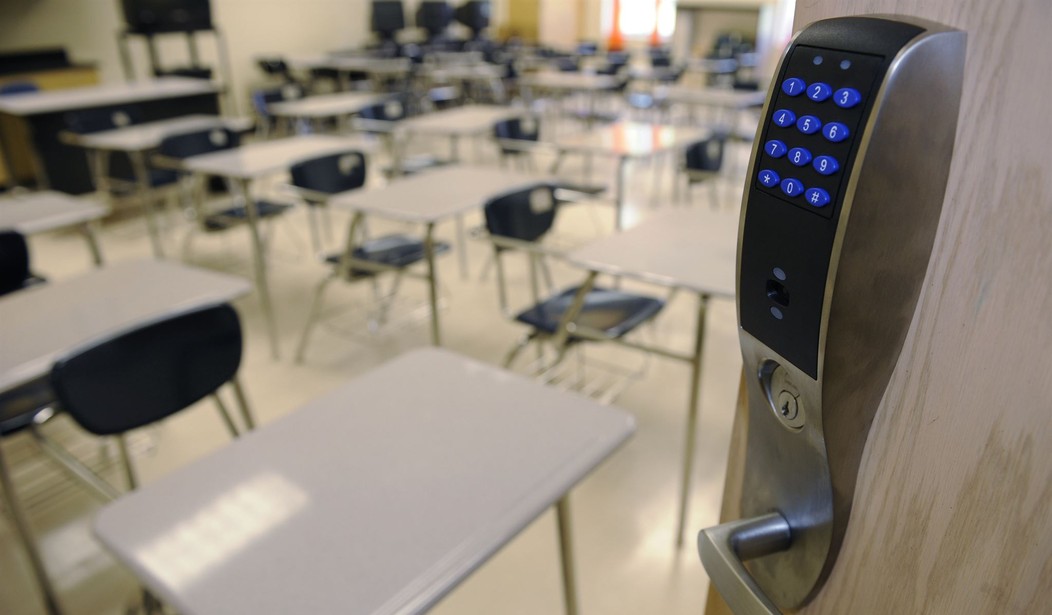It’s true, as the late, great Andrew Breitbart famously said, that “politics is downstream of culture.” But both are downstream of education. Nothing is more important to our families—or the future of our country.
In that regard, Republican Glen Younkin’s recent gubernatorial victory in Virginia, fueled in part by fed-up parents, was heartening. But does it signal that the tide has turned?
Not to downplay that happy outcome or the role brave parents played in it, but sadly, I think not. I still believe, as I wrote recently, that the “public” schools are lost to us. Which leaves parents to continue asking the same question they’ve been asking for nearly two years: “What can we do?”
There is no easy answer. Attempts to work within the system mostly aren’t succeeding, the occasional victory notwithstanding. School boards across the country grow increasingly more intransigent, digging in their heels and doubling down on mask mandates, Critical Race Theory, and LGBTQ+ propaganda.
No amount of pushback from parents, in the form of emails or newspaper editorials or impassioned speeches at board meetings, appears to have much effect. The education establishment is simply indifferent to parents’ concerns. They’re certain they know better, and that’s that.
Elections might make a temporary difference, but long-term, I believe conservative, Christian parents—indeed, all rational parents—must accept that “public schools” no longer serve the public. Instead, they have truly become “government schools,” promoting the ruling caste’s priorities over those of parents and students.
Recommended
So what can families do?
Charter schools are a viable alternative, where they exist. But they are difficult to get off the ground, often facing stiff opposition from within. And because they are publicly funded, they must follow many of the same policies as other public institutions. Fundamentally, charter schools are still government schools.
Traditional private schools—long the refuge of dissatisfied parents—are beyond the means of most families, especially those with multiple children, even in states with some sort of voucher program. In addition, many private schools today suffer from the same ills that plague government schools. They, too, have become leftwing indoctrination centers and bastions of “safetyism.”
Homeschooling works well for many families but by no means all. When both parents must work full-time, teaching children at home is simply not feasible. Many parents also have legitimate concerns about homeschooled children missing out on important social opportunities and extracurricular activities. Variations on the concept, such as homeschool academies or co-ops, can help alleviate some of those problems, but again—not for everyone.
Classical academies, combining private education with homeschooling, offer some promise. However, they also combine the necessity of paying tuition with the requirement that at least one parent be home two or three days a week. Once again, not every family can do that.
I don’t mean to disparage any of these models. All have their advantages, and one of them might be the best fit for you and your family. But clearly, even taken together, they are insufficient to address the situation, because many parents who would like to get their kids out of the government schools still feel trapped there.
For those desperate parents, I would like to propose another alternative. I actually think it’s the best option, combining the strengths of all the others—including those good, strong public schools many of us grew up in.
My idea, which I first outlined a few months ago, involves churches—many of which have large, often under-utilized facilities—partnering with other community organizations to create non-government schools that offer a high-quality education and are open to all, regardless of beliefs or ability to pay. These schools will be built on three main pillars: affordability, excellence, and accessibility.
Affordability means the cost of attending will be subsidized as needed, financed by donations, fund-raisers, and capital campaigns. Tuition will be as low as possible to begin with so that vouchers (where they exist) will cover most of the cost for students who qualify.
But students who cannot afford to pay the balance—or who don’t qualify for vouchers and can’t afford full price—will not be turned away for that reason. The schools will make up the difference through need-based scholarships.
In terms of excellence, the schools will borrow heavily from the classical model, emphasizing academic skills such as reading, writing, and mathematics along with accurate history, foreign languages, and the arts.
Many have warned that the sticking point for churches may be accessibility, by which I mean no student will be turned away based on their beliefs. Students will not be required to sign a “statement of faith”—although there certainly could be a behavioral contract or “honor code.”
I understand that churches wish to evangelize. But consider this: When you invite a child into your building, whether they ever join your church or embrace your doctrine, you are performing a vital service to them and the entire community. Society benefits because that child attended your school—whether they’re Baptist, Methodist, Catholic, Latter-day Saint, Jewish, or Muslim.
To paraphrase the former Archbishop of Washington, John Cardinal Hickey, “We don’t teach children because THEY are Christians; we teach them because WE are.”
If this is a model you can get behind, I would love to hear from you at the email address or Twitter handle in my bio. All are welcome—the more support, the stronger the movement—but I am particularly interested in people who bring specific skills to the table: experienced teachers and administrators, lawyers, financial experts, fund-raisers, marketing and IT professionals. All will be needed to make this idea a reality.
And I would especially like to hear from pastors and other community leaders who are interested in exploring the concept further. We literally cannot do this without you.

























Join the conversation as a VIP Member